Key takeaways:
- Selective mutism is an anxiety disorder that profoundly affects communication, often requiring empathy and understanding from others.
- Voice expression is vital for connection; it can alleviate feelings of isolation and foster healing even when speaking is challenging.
- Building confidence in communication involves setting small goals, practicing dialogues, and embracing silence as a valuable skill.
- Sharing personal stories can inspire and empower others, creating a supportive community and encouraging open expression.

Understanding Selective Mutism
Selective mutism is more than just a reluctance to speak; it’s a complex anxiety disorder often stemming from overwhelming fear in social situations. I remember the first time I encountered this—watching a child, vibrant and joyful in a familiar setting, suddenly withdraw into silence at school. It left me wondering: what could create such a powerful barrier to communication?
Understanding this condition requires empathy and patience. It’s not simply a choice; for many, speaking feels like facing an insurmountable wall. When I reflect on my own struggles, I think about the immense relief I felt when someone finally recognized my silence not as refusal, but as a form of expression. How many others might feel the same yet lack that understanding?
It’s important to recognize that selective mutism can vary widely in its presentation. Some children may only be silent in specific environments, like school, while being talkative at home. This duality can be confusing for both the individual and those around them. I’ve witnessed the frustration it can cause, not just in the child, but also in their families trying to connect. Isn’t it essential for us to foster spaces that honor these unique voices, even when they’re not heard audibly?
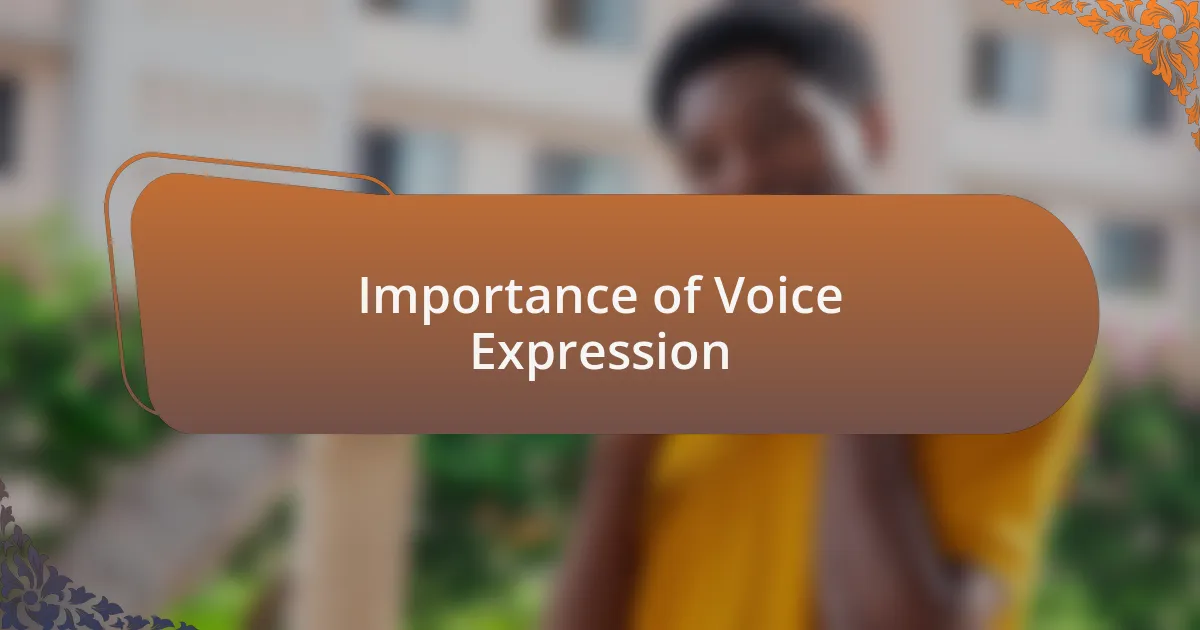
Importance of Voice Expression
Finding and expressing our unique voices is crucial for building connections and fostering understanding. I remember a moment when I finally spoke up in a small group after weeks of silence. The relief was incredible, like shedding a heavy cloak—I felt truly seen for the first time. This experience taught me how powerful voice expression can be, even when words are difficult to share.
When someone struggles to voice their feelings, it can lead to a sense of isolation. Often, I found myself feeling unheard and invisible, which only amplified my anxiety. Is it common to fear judgment so much that we hold back? Absolutely. The importance of voice expression lies not just in speaking but in the courage it takes to share parts of ourselves with others.
Every time I hear someone speak their truth, regardless of how it comes out, I’m reminded of the authenticity in voice expression. It’s not just about what is said; it’s about the emotions that drive those words. Whether through whispers or loud proclamations, the act of sharing our thoughts allows for healing and connection. Have you ever noticed how a simple conversation can change your entire day? That’s the beauty of embracing one’s voice.
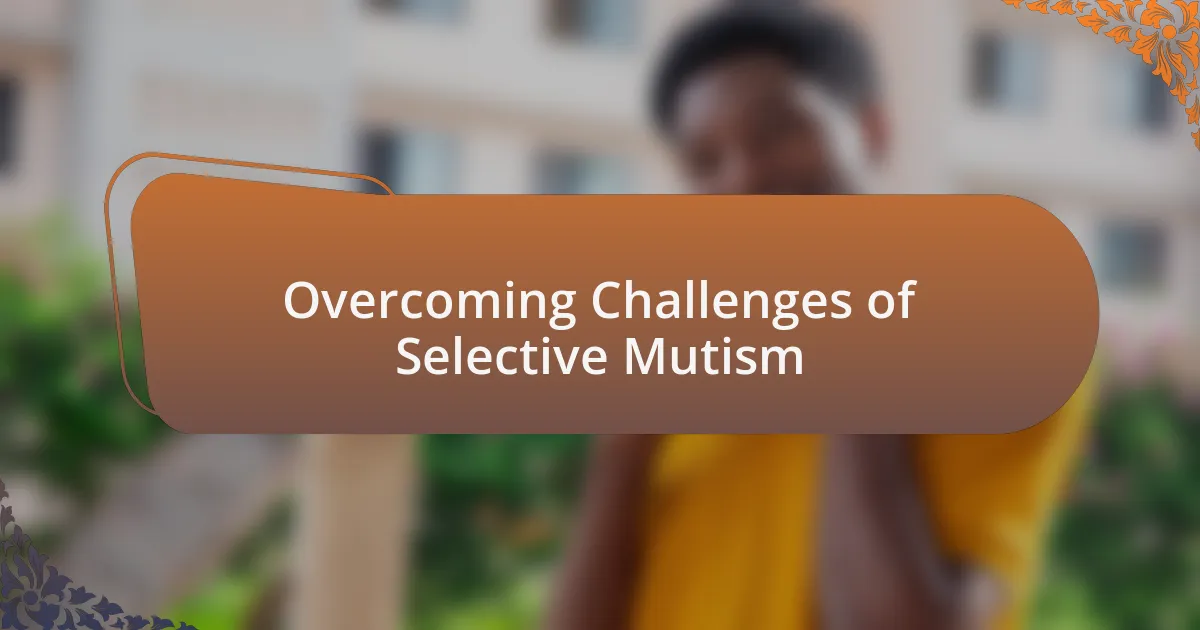
Overcoming Challenges of Selective Mutism
Selective mutism often presents significant hurdles, especially in social settings. I recall a time when attempting to order my favorite coffee felt like climbing a mountain. The pressure felt overwhelming, and even the simplest words seemed to escape me. It taught me that embracing challenges, no matter how trivial they seem to others, can lead to breakthroughs in personal courage and confidence.
Building connections while grappling with selective mutism can often feel like a paradox. I vividly remember attending a friend’s party, where my heart raced with the fear of engaging in conversation. It wasn’t until I decided to write messages on my phone that I started to feel comfortable enough to express myself. This unexpected method of communication allowed me to connect meaningfully without the immediate anxiety that speaking triggered. How often do we overlook alternative communication methods that fit our needs?
In the journey towards overcoming selective mutism, celebrating small victories is crucial. Each time I successfully initiated a conversation, however brief, I felt an exhilarating sense of accomplishment. It’s similar to planting seeds; with nurturing and patience, they slowly grow into something beautiful. Isn’t it inspiring to think how persistent efforts, no matter how small, can lead to significant changes over time? Each step forward builds a foundation for greater comfort and confidence in sharing our voices.
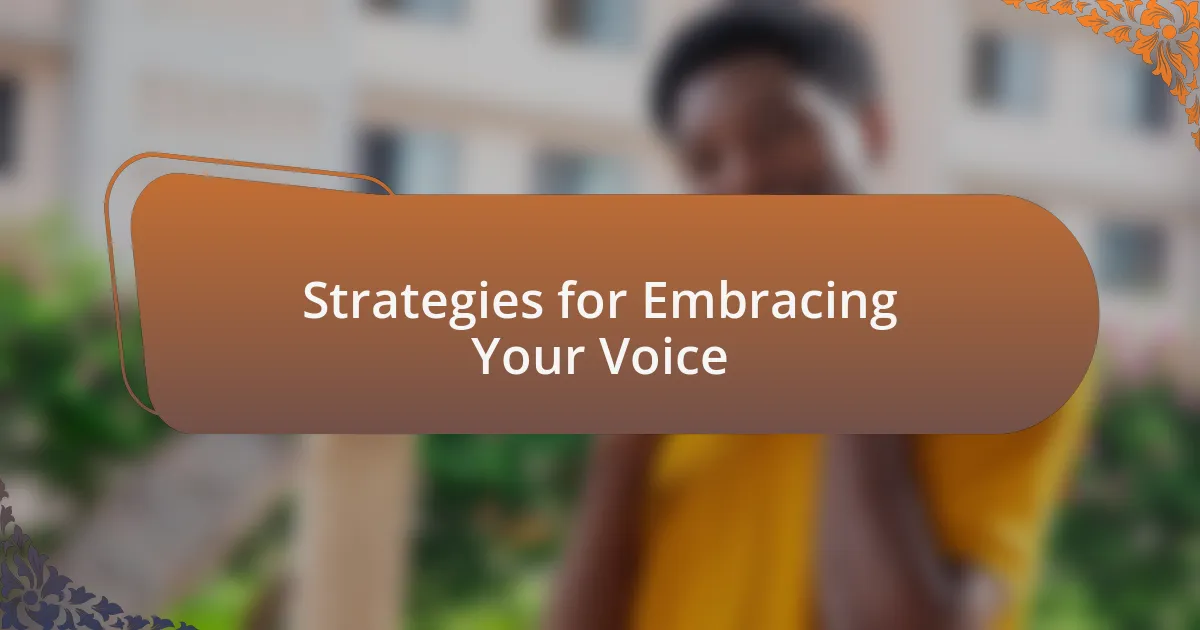
Strategies for Embracing Your Voice
One strategy I’ve found particularly helpful in embracing my voice is the use of journaling. I remember when I first started writing my thoughts down; it felt like releasing a pressure valve that had been tightly sealed for too long. Through journaling, I could explore my feelings and articulate my experiences without the immediate pressure of speaking aloud. Isn’t it interesting how words on a page can sometimes feel safer than spoken words?
Another powerful method is practicing self-affirmation. On days when anxiety creeps in, I often look in the mirror and remind myself of my strengths. I recall the first time I stood there, repeating phrases like, “I have something valuable to say,” and feeling a sense of warmth and confidence growing inside me. Have you ever tried affirming your worth aloud? It may seem simple, but those moments of self-recognition can genuinely shift our mindset toward one that embraces our unique voice.
Connecting with supportive peers can also make a world of difference. I often find solace in groups where others share similar experiences. I remember attending a small gathering of individuals with selective mutism, where we exchanged our stories through written notes instead of speech. That sense of solidarity fostered a safe environment, allowing me to express my thoughts more freely. How empowering is it to know you’re not alone in your journey? By creating connections with others, not only do we validate our own experiences, but we also cultivate a collective space where every voice matters.
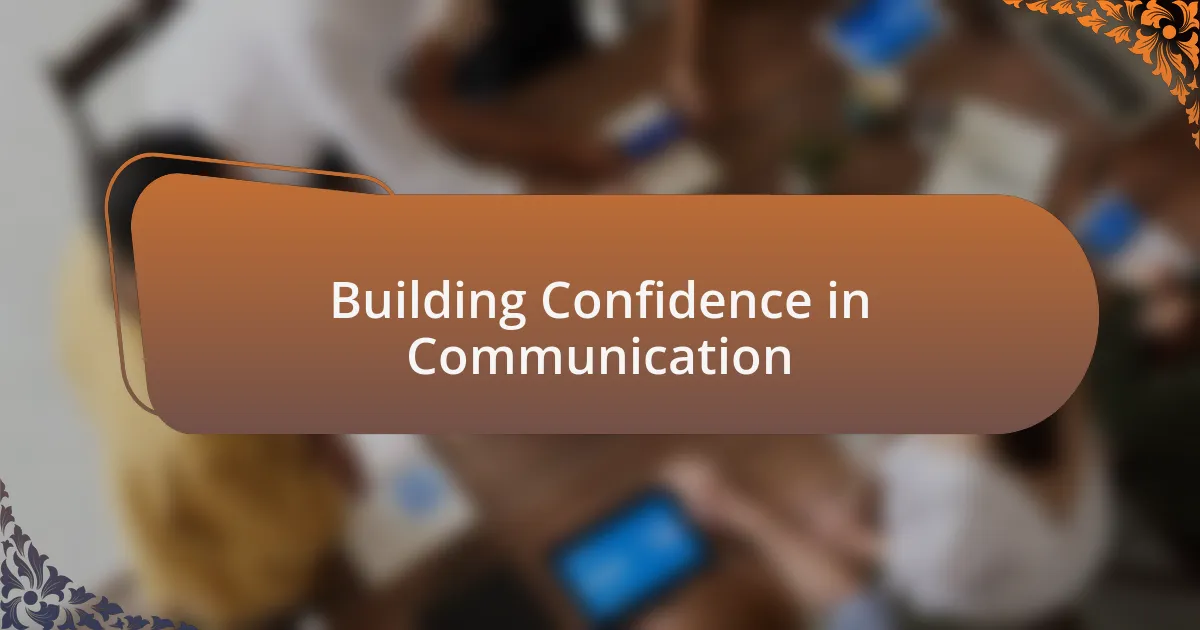
Building Confidence in Communication
Building confidence in communication often starts with setting small goals. I remember making it a point to say just one word during daily interactions, like “hello” or “thank you.” It felt daunting at first, but gradually, I noticed how accomplishing these tiny feats helped me build a foundation for more substantial conversations. Have you ever considered how little steps can lead to significant changes in your communication journey?
I’ve also found that role-playing can be a surprisingly effective tool. Picture this: I would sit with a friend and practice dialogues we might face in real-life situations. The funny part? We often ended up laughing at our exaggerated versions, easing my anxiety about how I might sound. This playful practice not only made speaking feel more manageable but also turned nerves into excitement. Isn’t it liberating to transform intimidating scenarios into something enjoyable?
Moreover, embracing silence can be just as powerful as speaking up. I vividly recall a time when I attended a workshop and chose to observe rather than jump in. Instead of feeling inferior, I learned by listening, gathering insights that eventually enriched my own voice. Sometimes, allowing ourselves the space to absorb rather than articulate can be a profound way to strengthen our communication skills. How often do we overlook the value of listening in our desire to be heard?
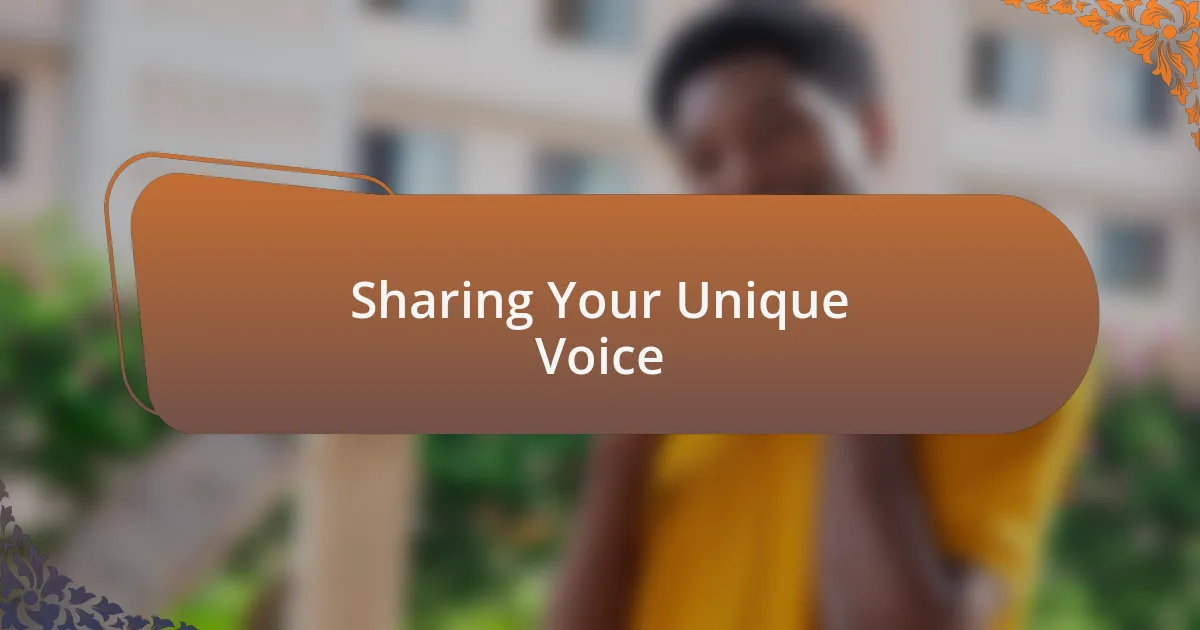
Sharing Your Unique Voice
As I began sharing my unique voice, I realized that authenticity is key. One morning, while chatting with a family member over coffee, I spoke about my creative passion for poetry. It was astonishing to see how my words opened up a heartfelt discussion, revealing shared experiences and emotions. Have you ever noticed how your true self can resonate deeply with others, sparking connections you never expected?
For me, sharing my unique voice wasn’t just about speaking; it was also about expressing myself through art. I vividly remember the first time I participated in an open mic night. The adrenaline rush was overwhelming, but once I shared my piece, I felt a wave of relief. It was as if I had let go of a weight I hadn’t known I was carrying. How many times have we held back our expressions, afraid of judgment, when in reality, our voices can inspire and uplift?
I often believe that our uniqueness can be our greatest strength. Reflecting on moments when I was vulnerable in conversation, such as sharing my struggles with selective mutism, I found that others often responded with understanding and kindness. It reinforced my belief that by embracing my voice, I could encourage others to do the same. Isn’t it fascinating how opening up can create a ripple effect, empowering those around us to share their stories too?
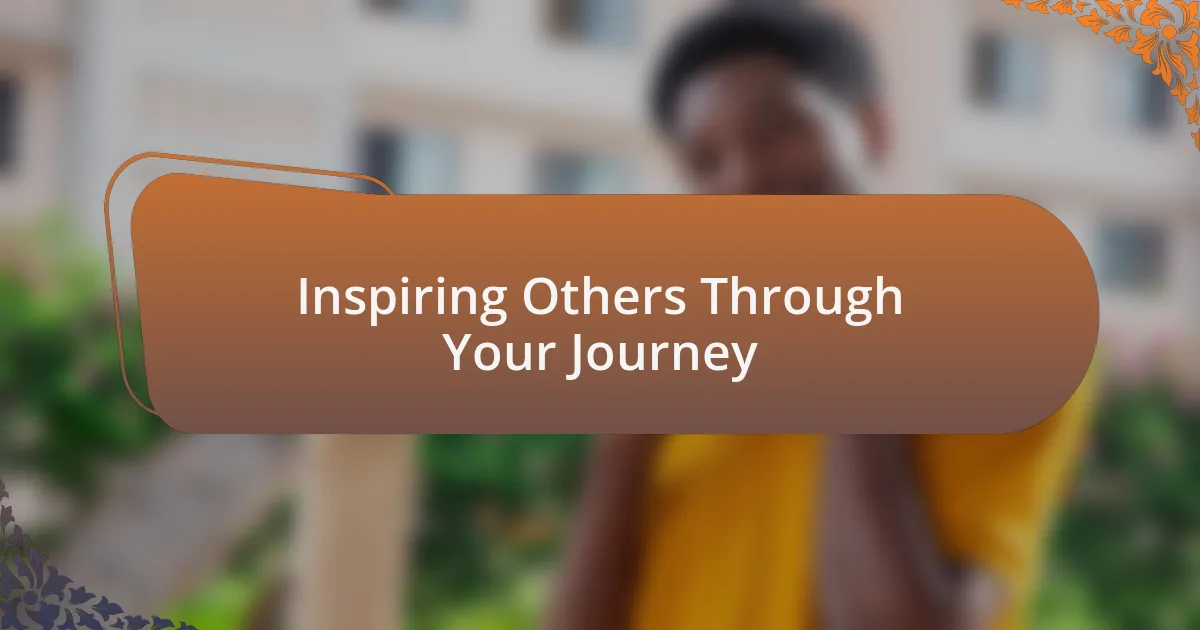
Inspiring Others Through Your Journey
I’ve discovered that embracing my unique journey can serve as a beacon of hope for others. Recently, I had the honor of speaking at a local support group for families dealing with selective mutism. As I shared my story of overcoming personal challenges, I noticed how the room shifted. Tears and smiles intertwined, showing that vulnerability can bridge the gap between isolation and support. Have you ever witnessed the impact of sharing a difficult moment and watching others feel seen in the process?
Through these experiences, I’ve come to realize that every voice has the power to inspire change. There was a time when I felt completely unheard, but the moment I began to share my struggles publicly, I noticed a transformation. Not only did I find strength in my truth, but others began to approach me, expressing gratitude for the courage it took to speak up. How often do we underestimate the influence of simply being open about our experiences?
It’s incredibly rewarding to see how my journey encourages others to step out of their own shadows. I often hear from people who reach out after engaging with my story, sharing their own battles and triumphs. This exchange fuels my belief that when we dare to express ourselves, we create a collective strength, a community that thrives on authenticity. Don’t you think that by sharing our unique voices, we cultivate a space where everyone can feel empowered to be themselves?